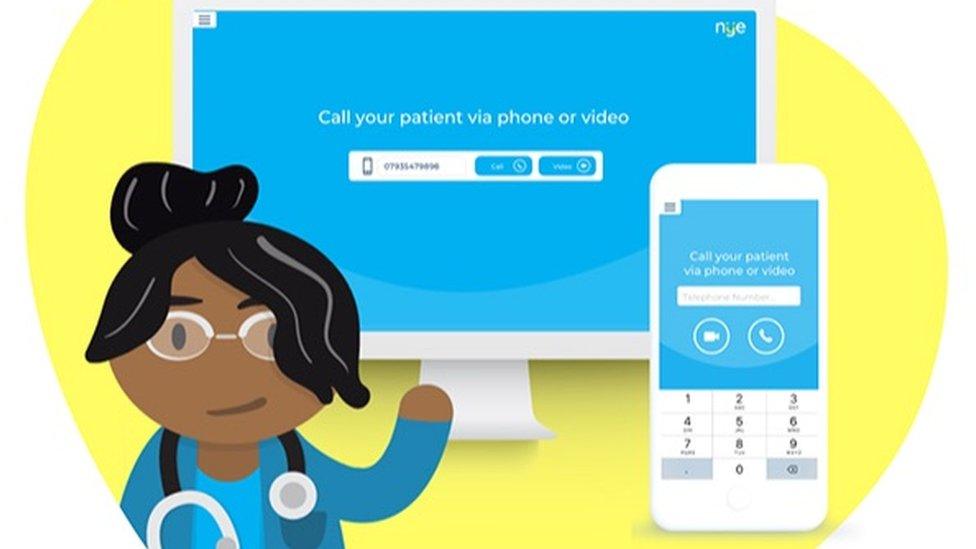Coronavirus: The tech minnows changing the NHS
- Published

There is a technology revolution going on in GP practices right now, driven by the extraordinary circumstances of the coronavirus crisis.
After years in which it seemed the local surgery was stuck in the digital dark ages, many have leapfrogged into the future in a matter of weeks, offering online and video consultations to patients.
Much of the change has been led by a tiny start-up whose whole approach has been deliberately low tech. Two years ago, AccuRx started offering a service that allows GP practices to communicate with their patients by text message - an "embarrassingly simple messaging solution" as founder Jacob Haddad puts it.
"No AI, no blockchain," he laughs.
Despite many practices still struggling to move out of the fax machine era, it proved popular. By early March, about half of all the GPs in England, and some in Wales, were using the service to tell patients their test results were fine or they could pick up a prescription.
Then, as it became clear that Covid-19 was going to have a big impact, AccuRx started offering new services that would make it easier for surgeries to deal with patients remotely.
"We've just been all hands on deck, getting features out," says Mr Haddad.
"Video consultations, a facility to send documents to patients and get responses, remote monitoring of patients."
Again, the approach has been pretty low-tech, designed to work with whatever devices doctors and patients may have.
The consultations usually start with a simple phone call, then if the GP decides they want to see something - perhaps a rash - the patient is sent a text with a link to activate a video call.
I was given a demonstration. When I clicked on the link, I was given a choice either to install an app or to use the phone's browser.
I chose the browser option, and although the video quality was not brilliant, it did the job.
From a standing start at the beginning of March, AccuRx's video consultations have taken off, and are now running at 35,000 a day.
With all sorts of practices suddenly eager to find new ways of working, more than 90% of GPs across England have signed up.
Surely, then, it must be coining it? No, because right now its services are free, although the company is hoping that in the longer term the NHS and other health services around the world will pay for its products.
Like many an ambitious young tech start-up, the firm is "pre-revenue". It's backed by about £9m of venture capital money from investors, who hope the "build it and they will come" philosophy will lead to big returns. It is growing fast but still has just 31 employees.
An even younger smaller operation is also showing how the doctor-patient relationship can be transformed in the smartphone era.
Just six weeks ago, an entrepreneurial GP, Dr Alexander Finlayson, launched NYE Health.
He describes it as a way to make the clinician's own device - whether that's their phone, tablet or desktop web browser - "NHS-compliant".

It means that doctors - whether in hospital or GP surgeries - can have video and audio conversations with patients or with other health workers in a secure way.
Dr Finlayson, who has worked on global health projects in Somalia and elsewhere, says NYE had been under way as a theoretical project for a while.
When confronted with the coronavirus crisis, he and a team of designers, engineers, and clinicians put the product together over an intense three-day brainstorming session.
It was released on 13 March and has already done tens of thousands of consultations, with users everywhere from intensive therapy units to dermatology departments and GP surgeries.
Just like AccuRx, NYE is pre-revenue and has not really thought much yet about a business model.
But it has already attracted interest from potential overseas customers and is being advised by Twitter's co-founder Biz Stone. Only 18 people are working on the project, but it sounds as though they could soon need to recruit many more.
The trailblazer for video consultations in the UK was Babylon, which offers the GP at Hand service.
This provides an alternative to the GP surgery and has proved popular with time-poor young professionals in London, who can book a video consultation at short notice rather than wait weeks to see the doctor.
Babylon, which also makes great play of its work applying artificial intelligence to healthcare, raised $550m (£439m) last year from backers including the Saudi Sovereign Wealth Fund, at a valuation of $2bn.
You might think that this was a business expanding rapidly during the current health crisis. Instead it is taking advantage of the government's job retention scheme to furlough 5% of its 2,000-strong workforce.
In a letter to staff, chief executive Ali Parsa said ideas his company had pioneered, such as the provision of healthcare on a mobile phone, had now become commonplace.
"There are many others who are doing the same thing and the current crisis has forced mass adoption and commoditisation of these technologies," he wrote.
A spokesman told me that Babylon no longer considered itself a telemedicine company, and was shifting its focus to AI.
It seems the disrupter has been disrupted, and minnows like AccuRx and NYE may play a bigger role in transforming healthcare delivery in the UK than the mighty Babylon.
